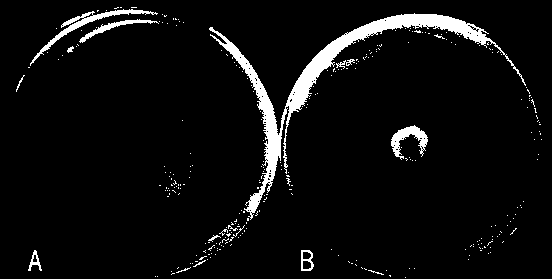Application of methylotrophic Bacillus zbl-1 in the control of cotton Verticillium wilt
A ZBL-1, methylotrophic technology, applied in the fields of application, bacteria, metabolic diseases, etc., can solve the problems of poor prevention and control technology effects, and achieve the effect of strong antibacterial and good application prospects
- Summary
- Abstract
- Description
- Claims
- Application Information
AI Technical Summary
Problems solved by technology
Method used
Image
Examples
Embodiment 1
[0032] Example 1: Isolation, screening and identification of Bacillus methylotrophicus ZBL-1CGMCCNo.11636
[0033] 1. Isolation and screening of strains
[0034] The methylotrophic bacillus (Bacillus methylotrophicus) used in the present invention is sampled from a large number of uninfected cotton roots in Shihezi City, Xinjiang, by the Plant Protection Institute of Xinjiang Academy of Agricultural Sciences, and prepared after shaking in sterile distilled water. Suspension, use the traditional plate culture method to isolate the bacteria in the soil layer, purify the strains by the plate streak method, use different culture temperatures, pH values, and medium as enrichment conditions, and optimize and screen out a batch of well-growing bacterial strains , from which a strain numbered ZBL-1 was selected.
[0035] Separation steps:
[0036] (1) The separation medium used: LB medium, peptone 10g, yeast extract 5g, NaCl 5g, distilled water 1L, pH natural.
[0037] (2) Separati...
Embodiment 2
[0050] Example 2: Molecular level identification of Bacillus methylotrophicus ZBL-1CGMCCNo.11636
[0051] The bacterial DNA genome kit was used to extract the DNA of the target strain.
[0052] Bacterial 16SrDNA universal primer sequence:
[0053] 27F: AGAGTTTGATCMTGGCTCAG;
[0054] 1492R:GGTTACCTTGTTACGACTT.
[0055] The primers, markers and reaction system used in this study were purchased from Beijing Dingguo Changsheng Biological Company.
[0056] Table 2: PCR reaction system used to extract genomic DNA
[0057]
[0058] As shown in Table 2, pre-denaturation at 94°C for 5 min; entering cycle, denaturation at 94°C for 30 s, annealing at 55°C for 30 s, extension at 72°C for 1 min, 35 cycles; extension at 72°C for 10 min, and sequencing.
[0059] Using the extracted total DNA of ZBL-1 as a template, PCR amplification was carried out using bacterial 16S rDNA universal primers to obtain an amplified product with a length of about 1.4 kb. The amplified product was recover...
Embodiment 3
[0060] Example 3: Growth Factors of Methylotrophic Bacillus (Bacillus methylotrophicus) ZBL-1CGMCCNo.11636
[0061] Table 3: Effects of temperature, pH, salt, and antibiotics on the growth of strain ZBL-1
[0062]
[0063]
[0064] Methylotrophic Bacillus (Bacillus methylotrophicus) ZBL-1CGMCCNo.11636 was cultured according to the above method. The culture conditions of the bacteria were: the culture medium was LB solid medium, and the culture conditions were pH7.0 and cultured at a temperature of 30°C. 48h.
[0065] From Table 3, the strain ZBL-1 is the most suitable growth factor.
[0066] Based on the above results, it can be concluded that the optimal culture time of Bacillus methylotrophicus ZBL-1CGMCC No.11636 as seeds is 48 hours, the optimum growth pH is 7.0, and the time for mass production of spores is 48 hours.
PUM
 Login to View More
Login to View More Abstract
Description
Claims
Application Information
 Login to View More
Login to View More - R&D
- Intellectual Property
- Life Sciences
- Materials
- Tech Scout
- Unparalleled Data Quality
- Higher Quality Content
- 60% Fewer Hallucinations
Browse by: Latest US Patents, China's latest patents, Technical Efficacy Thesaurus, Application Domain, Technology Topic, Popular Technical Reports.
© 2025 PatSnap. All rights reserved.Legal|Privacy policy|Modern Slavery Act Transparency Statement|Sitemap|About US| Contact US: help@patsnap.com



